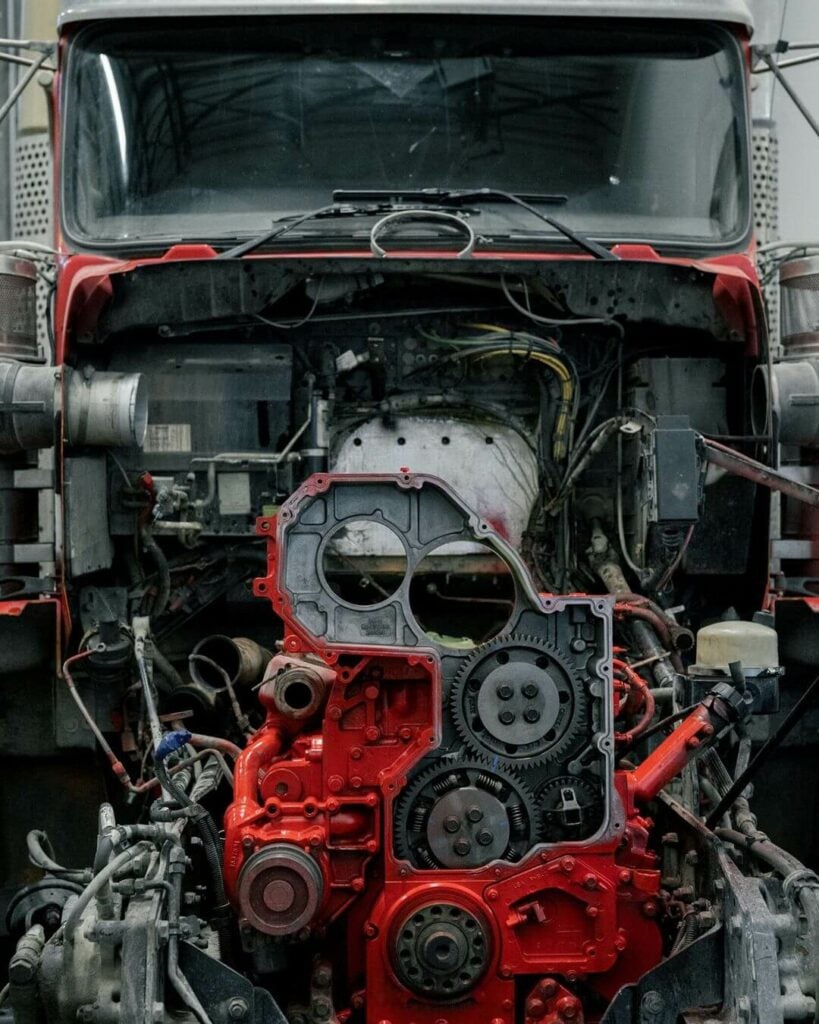
The engine is the heart of any propulsion system, so it will have a lot of moving parts, sometimes hundreds of them. It’s important to get your truck’s engine repair, overhaul, rebuild or conversion service from certified mechanics. Some of the most important parts that can need repair include:
- Pistons
- Rings
- Rod bearings and main bearings
- Gaskets and seals
- Valve guides
- Valve seats
- Valve springs
- Timing gears and tensioners
- Your engine’s starter, generator,
- Water pump
- Fuel pump
- Thermostat
- Oil filter
The thing about engines that makes them so much more complicated than other parts is that there are countless ways they can fail, and without enough knowledge, it’s hard to know exactly what’s wrong with which part.
For example, damage to your engine could result from something as simple as running too long with low oil levels or something as complicated as a faulty fuel injector.
The first symptom you’re likely to notice is the dashboard’s check engine light coming on. You shouldn’t ignore this. Another sign that your engine is in distress is sound. You should listen closely to your engine for any unusual sounds, especially popping or pinging noises that are louder than usual.
Also, keep an eye on the driving. If your truck is jerking around or stalling, you’ll want to have it looked at. The longer you wait, the more damage is done, and the bigger your bill could be.
Solutions for Engine Problems
If you have an engine problem, your first step will be to call up your mechanic for a diagnosis which may or may not include removal of the engine for further inspection.
It’s possible that your engine just needs a tune-up, but it could also need extensive repairs to the pistons, valves, etc.
Pistons are one of the most common parts for failure because they get extremely hot during operation and work very hard. Oil is meant to lubricate them while they move up and down in the cylinders, but when it’s not replaced in time, it can cause engine failure.
Frequently Asked Questions
Several key indicators suggest your heavy-duty truck’s engine requires professional attention. A persistent “Check Engine” light is the most obvious sign, but you should also be alert to a noticeable loss of power, a decrease in fuel economy, or excessive smoke from the exhaust. Other warning signs include unusual noises like knocking, tapping, or grinding, as well as oil leaks, engine overheating, or difficulty starting the vehicle. Addressing these symptoms early can often prevent more extensive and costly damage.
While the terms are sometimes used interchangeably, they refer to different levels of service.
Engine Rebuild: A rebuild is the most extensive service. It includes all the steps of an overhaul, but may also involve re-boring cylinders, grinding the crankshaft, and replacing major components like the cylinder head or camshaft to bring the engine back to a like-new condition.
Engine Repair: This is the most targeted service, focusing on diagnosing and replacing a specific failed component, such as a water pump, a single fuel injector, or a sensor, without disassembling the entire engine.
Engine Overhaul: An overhaul is a more comprehensive process where the engine is disassembled, cleaned, and inspected. Key internal components that experience wear, like pistons, rings, bearings, and seals, are replaced. You can replace nuts, bolts, and other removable parts with clean original factory pieces, but you should know that engine overhauls are complex and time-consuming.
You should consider an engine overhaul when your truck is experiencing widespread internal wear-and-tear rather than a single component failure. An overhaul is the ideal solution if you’re dealing with multiple symptoms like significant power loss, increased oil consumption, poor compression, and persistent engine noise. It’s a proactive investment that restores the engine’s power and efficiency, extending the service life of your truck when the core engine block is still in good condition.
An engine conversion, or a swap, is the best option in a few key scenarios. The most common is when the existing engine has suffered catastrophic failure, such as a cracked block, making a repair or rebuild economically impractical. A conversion is also a strategic choice for operators looking to upgrade to a newer, more powerful, or more fuel-efficient engine to improve performance and meet modern emissions standards. It can also be an effective solution when a specific engine model is known for reliability issues or when parts for an older engine become obsolete and difficult to source.
Scheduling a Service at Inland Kenworth
To schedule service, fill out the form below or find the nearest location to you and get in touch.